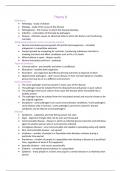Summary
Summary MBY161 theme 8 notes
- Course
- Institution
These notes are a 2-page summary of MBY161 theme 8. They provide a detailed but concise overview of the lecture notes. They were written by a student who obtained a distinction in the module.
[Show more]



